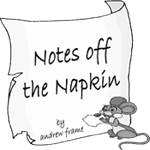 By Andrew Frame
By Andrew Frame
I got the e-mail one morning, sent by my mate in Dublin, and addressed to our entire talent network: “I need an ‘urban’ or ‘street’ read on these two scripts, can anyone help out? Reply directly to me...”
Then, to me privately, a followup e-mail added, “Over here, we’d just say ‘black’, but I don’t know how that goes over on your side of the pond anymore.”
I spent quite a bit of my adult life in a black church, and I’m as white as the famous Dover cliffs. Those in the congregation to whom I was close, and could discuss “sensitive” issues would tell me simply, “I’m black. Labels are for politicians and pigeon-holers. You’re white. I’m black.” For me, that was all there was to it. In some cases there was interest in cultural heritage, but these folks were far, far from wherever their ancestors had lived, as far as I am from the parts of northern Europe my family was said to be from.
A short while later, as more members of the group logged in for the morning, a message popped up from Roy, a man who has swung an axe in the studio and on stage with Names Who We Shall Not Divulge Here, and now runs a successful production company in Portland:
“It might help if we try to define ‘urban’. I’m of a mixed breeding so in my case urban descriptors mean several things [to me]. (Mostly Cherokee and Lebanese mind you, but proud of all my roots — they mix us up good in New Orleans.) Do you want Theo Huxtable? ...Fifty Cent? Heaven forbid you want Vanilla Ice! Do you want Antoine (of Living Color?) ...Ghetto Gus? ...Aunt Jemima? ... someone from Chicago, Harlem, New Orleans, Kabanga, Hoo-Too? No offense folks but don’t be afraid to specify! I believe the same is applicable to the generic Latino. I hear a big difference in Juanny’s [Florida] reads as opposed to Ricardo’s [Texas] reads. No jabs, just a matter of dialect. In my case, a Puerto Rican may sound blatantly ridiculous to our primarily Mexican population. Recently, I had a conversation with a fellow who indignantly replied, “I do not speak that filth! I speak real Castillian Spanish!” OK! Maybe he was overly sensitive, I don’t know. Confessionally, a black programmer locally asks me to do my New Orleans brother voice for him.... I think this is an appropriate question. I think it does matter.”
Roy addressed the issue of dialect, in the framework of comparison to the current status of culture. Dialect from proper, accent-less diction, to unintelligible syllabic run-ons. Every language has this. How any language sounds when properly used, and when sloppily used.
Somewhere in there was what our Irish mate was after, and Juanny followed up Roy’s e-mail with:
“I believe after I sent my voiceover [to Dublin] which was too mellow he asked to go for ‘wassup my [homies]’ so I did. That is after all what I do, character voices. If a producer says to me “I want Colombo with a twist of Barney Fife,” I give it to him. If a valued colleague from across the pond says, “I need an urban voice that’s more ‘wassup [homies]’.” I give that to him. If I’m asked to play a sexually ambiguous lemur, or a royal sounding lion, I do that too. I’ll be your concerned father or football star brother or evil villain with a bad Transylvanian accent or traveler with an Australian accent or spa voice with a British accent.”
Now, Roy and Juanny have experienced first hand the differences in dialect in their own (relatively speaking) native cultures. They can appropriately use the language anywhere along the sliding scale of Dictionary to the aforementioned Unintelligible Syllabic Run-On.
Allow another example, this happening to me this past week.
A call comes in for a Spanish talent. I know full well that there is a caste system among Hispanics, especially in the Caribbean-influenced region where I live. Culturally, if a person speaks Spanish with a Mexican dialect, Cubans and Puerto Ricans will ignore them as unimportant. This is what happened to me.
I sent the script to a Spanish talent, not inquiring of his dialect. When the client listened to the audio, he nailed it immediately. “This is going to end up in south Florida, and some areas of South America. I can’t have a Mexican accent on it. It won’t be accepted.”
I kicked myself. I knew this from previous experience. “Not something we can let slide this time?” I asked anyway. “I’m afraid not,” he said. “The closest comparison I could give you is someone with a Boston dialect selling cornbread mix in Tifton, Georgia.”
It took a couple of days, but I found an excellent talent and engineer that not only delivered a terrific read (Cuban dialect), but they corrected the errors in the client written Spanish script.
I suppose political-correctness has a place - certainly among those who live it as a lifestyle - so knowing what to say, and how to say to that crowd is necessary. But among ourselves, we need to be able to say what we need, and not be offended if we’re on the receiving end of the e-mail. I feel for my Irish mate who felt he had to sanitize his message.
As with all things-that-make-you-think, this one made us think, and hopefully will help to improve our producer-to-producer communication.
♦

